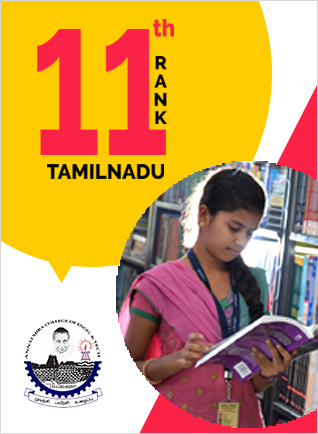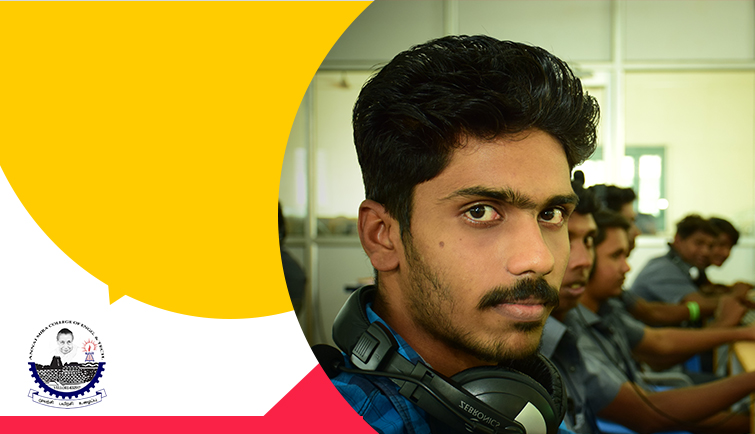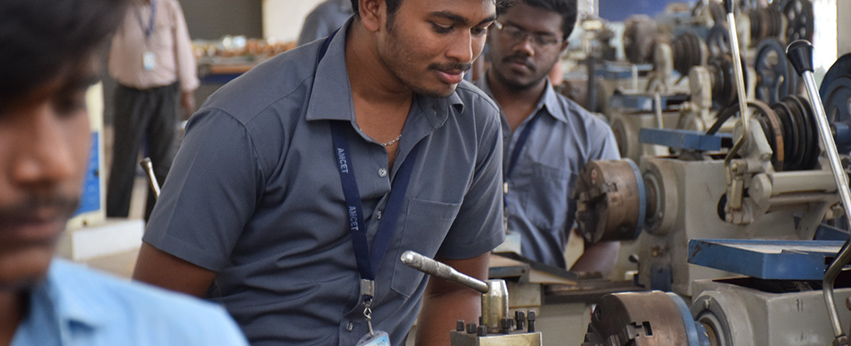- Email: [email protected]
- Mobile: 94433 04963
- Online Grievances
- Careers
- Contact Us
- Follow Us:
Admissions Hotline - 99523 87017
About Department
The Department of Mechanical Engineering was established in the academic year 2012-13, with a commitment to providing high-quality education and fostering discipline among students. Our faculty members play a pivotal role in delivering personalized attention to each student, motivating them to reach their professional aspirations.
The curriculum is meticulously designed to align with the evolving needs of the industry and corporate sectors, ensuring that students are well-prepared for the challenges of the modern workforce. The department encourages robust interaction between staff and students, fostering a dynamic learning environment.
All laboratories are equipped with advanced facilities, meeting the requirements of the curriculum to facilitate hands-on learning. The department boasts a team of highly qualified and experienced faculty members, many of whom actively contribute to research in their respective fields. Their research endeavours are frequently published in prestigious national and international journals.
To keep faculty members abreast of emerging technological trends, the department organizes regular workshops focused on advanced topics in mechanical engineering. State-of-the-art facilities are available, including modern laboratories, e-learning-enabled classrooms, and a well-stocked department library, all contributing to an enriched academic experience. Additionally, the department houses a fully equipped centralized workshop, serving the needs of various other departments. To complement the academic curriculum, guest lectures by industry experts and regular industrial visits are arranged, providing students with valuable exposure to real-world applications.
We strive for holistic excellence, encouraging students to participate in extra-curricular activities that enhance their overall development.
VISION
We aspire to cultivate dynamic, skilled, and innovative mechanical engineers who actively contribute to society.
MISSION
- Our mission is to educate students to become proficient and professional mechanical engineers.
- We aim to nurture students into dynamic mechanical engineers with entrepreneurial capabilities.
- We strive to inspire students to pursue advanced studies and research in mechanical engineering.
- Our goal is to develop professionals who are socially committed to making a difference as mechanical engineers.
PROGRAM EDUCATIONAL OBJECTIVES (PEOs)
- PEO-01:Effectuating success in careers by exploring with the design, digital and computational analysis of engineering systems, experimentation and testing, smart manufacturing, technical services, and research.
- PEO-02:Amalgamating effectively with stakeholders to update and improve their core competencies and abilities to ethically compete in the ever-changing multicultural global enterprise.
- PEO-03:To encourage multi-disciplinary research and development to foster advanced technology, and to nurture innovation and entrepreneurship in order to compete successfully in the global economy.
- PEO-04:To globally share and apply technical knowledge to create new opportunities that proactively advances our society through team efforts and to solve various challenging technical, environmental and societal problems.
- PEO-05:To create world class mechanical engineers capable of practice engineering ethically with a solid vision to become great leaders in academia, industries and society.
PROGRAM OUTCOMES (POs)
PO GRADUATE ATTRIBUTE
- PO-01:Engineering knowledge: Apply the knowledge of mathematics, science, engineering fundamentals, and an engineering specialization to the solution of complex engineering problems.
- PO-02:Problem analysis: Identify, formulate, review research literature, and analyse complex engineering problems reaching substantiated conclusions using first principles of mathematics, natural sciences, and engineering sciences.
- PO-03:Design/development of solutions: Design solutions for complex engineering problems and design system components or processes that meet the specified needs with appropriate consideration for the public health and safety, and the cultural, societal, and environmental considerations.
- PO-04:Conduct investigations of complex problems: Use research-based knowledge and research methods including design of experiments, analysis and interpretation of data, and synthesis of the information to provide valid conclusions.
- PO-05:Modern tool usage: Create, select, and apply appropriate techniques, resources, and modern engineering and IT tools including prediction and modelling to complex engineering activities with an understanding of the limitations.
- PO-06:The engineer and society: Apply reasoning informed by the contextual knowledge to assess societal, health, safety, legal and cultural issues and the consequent responsibilities relevant to the professional engineering practice
- PO-07:Environment and sustainability: Understand the impact of the professional engineering solutions in societal and environmental contexts, and demonstrate the knowledge of, and need for sustainable development.
- PO-08:Ethics: Apply ethical principles and commit to professional ethics and responsibilities and norms of the engineering practice.
- PO-09:Individual and team work: Function effectively as an individual, and as a member or leader in diverse teams, and in multidisciplinary settings.
- PO-10:Communication: Communicate effectively on complex engineering activities with the engineering community and with society at large, such as, being able to comprehend and write effective reports and design documentation, make effective presentations, and give and receive clear instructions.
- PO-11:Project management and finance: Demonstrate knowledge and understanding of the engineering and management principles and apply these to one’s own work, as a member and leader in a team, to manage projects and in multidisciplinary environments.
- PO-12:Life-long learning: Recognize the need for, and have the preparation and ability to engage in independent and life-long learning in the broadest context of technological change.
PROGRAM SPECIFIC OUTCOMES (PSOs)
On successful completion of the Mechanical Engineering Degree programme, the Graduates shall exhibit the following:
- PSO-01:Apply the knowledge gained in Mechanical Engineering for design and development and manufacture of engineering systems.
- PSO-02:Apply the knowledge acquired to investigate research-oriented problems in mechanical engineering with due consideration for environmental and social impacts.
- PSO-03:Use the engineering analysis and data management tools for effective management of multidisciplinary projects.
B.E Mechanical Engineering Admission Process
The admission process for B.E Mechanical Engineering is based on the marks obtained in the higher secondary exam.
- Students after qualifying their 10+2 exam from the maths stream with a minimum of 40% of marks are eligible to apply for admission in this course.
- On the basis of these eligibility criteria, students are granted admission to this course.





